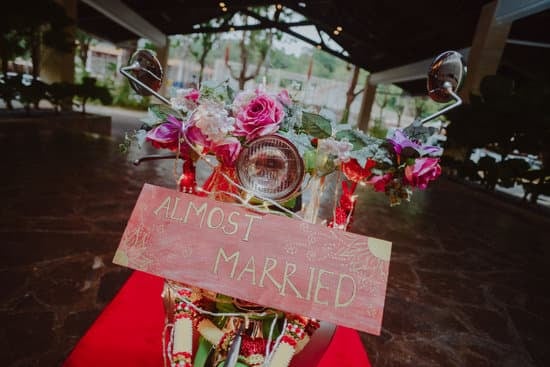Are you asking yourself, “How do I plan a wedding?” Planning a wedding can be both exciting and overwhelming, but with the right guidance and resources, it can also be a rewarding experience.
From setting a budget to choosing the perfect venue, selecting vendors, creating a guest list, and managing the logistics of the big day, there are numerous considerations to take into account when planning a wedding. In this comprehensive guide, we will break down each step of the wedding planning process to help you navigate through this important milestone in your life.
When it comes to planning a wedding, one of the first and most crucial steps is setting a budget. Your budget will dictate every other decision you make during the planning process, so it’s important to establish realistic financial parameters from the start. Once your budget is set, the next step is finding the perfect venue that fits within your financial constraints and also aligns with your vision for your special day.
Choosing wedding vendors such as photographers, caterers, florists, and others is another significant aspect of wedding planning. These professionals will play an essential role in bringing your dream wedding to life, so careful consideration and research should go into selecting the best vendors that align with your style and preferences.
Throughout this guide, we will provide valuable tips and advice on how to navigate through each stage of wedding planning to ensure that everything goes smoothly leading up to your big day.
Setting a Budget for Your Wedding
Planning a wedding can be an exciting and joyful time for couples, but it also comes with its fair share of stress, especially when it comes to setting a budget. A well-thought-out budget is essential for keeping wedding expenses under control and ensuring that everything goes smoothly on the big day. Here are some tips on how to plan a wedding budget effectively:
- Begin by discussing your financial situation with your partner and any family members who may be contributing to the wedding fund. Be open and honest about what you can afford, and set realistic expectations for the overall cost of the event.
- Make a list of all the potential expenses associated with your wedding, including venue rental, catering, photography, attire, decorations, and entertainment. Research typical costs in your area to get an idea of how much each item might cost.
- Prioritize your expenses based on what is most important to you as a couple. Allocate more funds to aspects of the wedding that are high on your priority list, such as a stunning venue or a top-notch photographer.
It’s important to remember that unexpected expenses often arise during the course of planning a wedding. By establishing a comprehensive budget from the start, you can better prepare for these surprises and avoid unnecessary stress as you continue with the planning process.
In addition to considering traditional weddings costs such as attire and catering, couples should also think about other expenditures such as guest accommodations or transportation needs. By carefully mapping out all potential costs ahead of time, couples can avoid going over their allocated budget.
Finding the Perfect Venue
When planning a wedding, one of the most important decisions to make is choosing the perfect venue. The right venue sets the tone for the entire event and can greatly impact the overall experience for you and your guests. Before you start looking at venues, it’s essential to have a clear understanding of your budget and guest list. This will help narrow down your options and ensure that you find a space that meets your needs.
Once you have an idea of your budget and guest count, it’s time to start researching venues. Consider factors such as location, style, capacity, and amenities when evaluating potential venues. Do you envision a rustic outdoor wedding, an elegant ballroom affair, or something with a more modern twist? Think about what type of setting reflects your personal style and preferences as a couple.
After identifying a few top contenders, schedule site visits to see the venues in person. During these visits, take note of the layout of each space, potential photo opportunities, parking availability, and any restrictions or rules that may apply. Don’t be afraid to ask questions and request specific details about what is included in the rental fee. It’s crucial to have a clear understanding of what each venue offers before making your final decision.
| Factors to Consider | Details |
|---|---|
| Location | Consider proximity to hotels for guests’ accommodations |
| Style | Determine if the venue matches the aesthetic you want for your wedding |
| Capacity | Ensure that the venue can comfortably accommodate your guest list |
Choosing Wedding Vendors (Photographer, Caterer, Florist, Etc)
As you plan your wedding, one of the most important decisions you will make is choosing the right vendors to help bring your special day to life. From capturing precious moments to filling your guests’ bellies and adorning your venue with beautiful blooms, selecting the perfect photographer, caterer, and florist is crucial. Here’s how to ensure you make the best choices for your big day.
Research and Recommendations
When it comes to finding the right vendors for your wedding, thorough research is key. Start by asking friends and family for recommendations or reading online reviews. Wedding planning websites and social media platforms can also provide valuable insights into potential vendors’ performance. Once you have a list of candidates, schedule interviews to get a feel for their personality and style.
Review Portfolios and Tastings
Before making any decisions, take the time to review each vendor’s portfolio or sample work. Whether it’s sampling a caterer’s menu, reviewing a photographer’s portfolio, or discussing floral arrangements with a florist, this step will give you a clear idea of their style and capabilities. Most reputable vendors will be more than happy to arrange tastings or consultations as part of their services.
Contracts and Communication
Once you’ve made your decisions, it’s crucial to secure your chosen vendors with signed contracts outlining all the necessary details such as services provided, payment schedules, cancellation policies, etc. Clear communication is also vital throughout the planning process. Regular check-ins with your selected vendors will help ensure that everything is on track for your big day.
Creating the Guest List and Sending Invitations
Compiling Your Guest List
One of the first steps in planning your wedding is compiling a guest list. Start by sitting down with your partner and making a list of all the people you both want to invite. This may include close family members, friends, colleagues, and other important people in your lives. Keep in mind that the size of your guest list will have a major impact on your budget and venue options, so it’s crucial to establish this early on.
Choosing Your Invitation Style
Once you have finalized your guest list, it’s time to choose the style of invitations you want to send out. Whether you prefer traditional or modern invitations, there are countless design options to choose from. Consider hiring a professional stationery designer or opting for DIY invitations if you’re feeling crafty.
Sending Out Save-the-Dates
Sending out save-the-date cards is important if you have many guests traveling from out of town. These cards give your guests a heads up about the date of your wedding so they can make travel arrangements well in advance. You can opt for physical save-the-date cards or go digital with e-vites, depending on your preference and budget.
After going through this section on creating a guest list and sending out invitations, you should now have a better idea of how to plan for these critical aspects of your big day. When thinking about “how do I plan a wedding,” remember that this is just one step in making sure everything runs smoothly on your special day.
Wedding Decor and Theme Planning
When planning a wedding, one of the most exciting aspects for many couples is choosing the decor and theme for their big day. The right decor and theme can make your wedding feel unique and personal to you and your partner.
To start planning your wedding decor and theme, consider the following steps:
1. Brainstorm Ideas: Sit down with your partner and discuss what kind of atmosphere you want to create for your wedding. Do you envision a romantic, rustic affair? Or perhaps a modern, minimalist celebration? Make a list of themes or decorative elements that resonate with both of you.
2. Consider Your Venue: Take into account the setting of your wedding venue when planning your decor and theme. If you’re getting married in a lush garden, for example, you may want to incorporate natural elements such as flowers, greenery, and wooden accents into your decor.
3. Create a Mood Board: Once you have some ideas in mind, create a mood board or Pinterest board to visually organize your inspirations. Include images of color schemes, floral arrangements, table settings, and any other decorative elements that appeal to you.
Once these initial steps are completed, start shopping around for decorations that fit within budget and align with your chosen theme. With careful planning and attention to detail, you’ll be able to create a beautiful ambiance that perfectly reflects the love between you and your partner on your special day.
Selecting the Wedding Attire for the Bride, Groom, and Wedding Party
When it comes to planning a wedding, selecting the perfect attire for the bride, groom, and wedding party is a crucial aspect. The wedding attire sets the tone for the entire event and contributes to the overall aesthetic of the celebration.
For brides, it’s essential to start shopping for a wedding dress well in advance to ensure enough time for alterations and fittings. Grooms should also begin looking for their attire early on and consider whether they will buy or rent their suit or tuxedo.
Once the bride and groom have chosen their attire, they can move on to coordinating the wedding party’s outfits. Bridesmaids’ dresses and groomsmen’s suits should complement the overall theme and color scheme of the wedding. Choosing a cohesive look for the entire wedding party will contribute to beautiful and cohesive photos on the big day. It’s essential to take everyone’s opinions into account when making these decisions.
When considering how do I plan a wedding, selecting outfits should be aligned with your budget as these ensembles can be quite expensive. Additionally, you must account for accessories when planning your attire such as shoes, jewelry, veils, boutonnieres, and other items that complete your look on your special day.
| Aspect | Details |
|---|---|
| Bride’s Attire | Begin shopping well in advance; Consider budget; Coordinate with bridesmaids’ dresses |
| Groom’s Attire | Start early; Decide whether to buy or rent; Account for accessories |
| Wedding Party Outfits | Coordinate with overall theme; Consider everyone’s opinion; Account for cost of outfits + accessories |
Planning the Ceremony and Reception Schedule
Once you have chosen your venue and vendors, it’s time to start planning the actual schedule for your wedding day. It’s important to create a timeline that includes the ceremony, cocktail hour, reception, and any other special moments you want to include. Start by working backwards from your desired end time for the reception, taking into account things like the sunset (for outdoor weddings), travel time between locations, and any special activities or traditions you want to incorporate.
When planning the ceremony and reception schedule, it’s crucial to communicate with your vendors. Your DJ or band, photographer, and caterer will all need to know when certain events are happening so they can be prepared. Make sure they are aware of any specific timing details or special moments so they can capture them efficiently.
In addition to communicating with your vendors, it’s essential to also consider the comfort and enjoyment of your guests. Providing a well-structured schedule will keep everyone on track and ensure that no one misses out on important moments throughout the day. Be sure to include buffers in your timeline to account for any unexpected delays that may arise. By meticulously planning the ceremony and reception schedule, you can help ensure that everything runs smoothly on your big day.
Managing Wedding Day Logistics (Transportation, Accommodations, Etc)
Once all the major aspects of your wedding have been planned, it’s important to turn your attention to the logistics for the big day. This includes transportation for the wedding party and guests, as well as accommodations for out-of-town guests. One of the most important things to consider is how you and your wedding party will get from place to place on your special day.
You may need transportation from your home or hotel to the ceremony venue, and then on to the reception. Consider renting a limousine, party bus, or even a classic car for a memorable touch.
In addition to transportation, it is also crucial to make sure that accommodations are arranged for any out-of-town guests who will be attending your wedding. Look into reserving a block of hotel rooms at a nearby hotel, or consider other lodging options such as Airbnb rentals or bed and breakfasts. Providing information about lodging options on your wedding website or including it in your invitations will help make it easier for guests traveling from out of town.
Wedding day logistics can be overwhelming with so many moving parts, but careful planning and organization can help ensure that everything runs smoothly. Make detailed schedules and timelines for each aspect of the day, including getting ready, transportation times, photo sessions, and more.
It’s also a good idea to designate one or two people (such as a trusted bridesmaid or groomsman) to oversee these logistics on the day itself, freeing you up to enjoy every moment of your special daystress-free.
Dealing With Wedding Day Emergencies and Last-Minute Details
In conclusion, planning a wedding can be an exciting and stressful process. From setting a budget to choosing the perfect venue, selecting vendors, creating a guest list, and managing last-minute details, there are many factors to consider when organizing a wedding. The key is to stay organized, flexible, and prepared for any unexpected emergencies that may arise on the big day.
One of the most important aspects of wedding planning is setting a realistic budget. By determining how much you can afford to spend on your special day, you can prioritize your expenses and avoid overspending. Finding the perfect venue and choosing reliable vendors are also crucial steps in creating the wedding of your dreams.
Creating a detailed schedule for both the ceremony and reception will help ensure that everything runs smoothly on the wedding day. Managing logistics such as transportation and accommodations for out-of-town guests will also contribute to a successful event.
Finally, being prepared to deal with any last-minute emergencies or details will give you peace of mind as you celebrate this joyous occasion with your loved ones. Remember, when asking yourself “how do I plan a wedding,” staying organized and proactive is key to a successful and memorable event.
Frequently Asked Questions
How Do I Start Planning My Wedding?
Starting to plan your wedding can feel overwhelming, but a good place to start is by setting a budget and creating a rough guest list. From there, you can start looking into potential venues and vendors. It’s also important to consider any specific preferences or themes you may have in mind for your wedding day.
What Are the Basics for Planning the Wedding?
The basics for planning a wedding include determining the date, selecting a venue, finding a caterer, choosing a photographer, deciding on the style and theme of the wedding, as well as making decisions about the bridal party and guest list. These initial steps will lay the foundation for the rest of the planning process.
What Are the Steps for a Wedding?
The first step in planning a wedding is setting the budget and creating a guest list. Once those are established, it’s time to find and book a venue, hire key vendors such as caterers and photographers, choose the bridal party, send out invitations, select attire for the bride and groom, plan the ceremony and reception details, organize transportation, accommodations if necessary, and ensure that all legal requirements are met.
Finally, creating a timeline for the big day is essential to keep everything running smoothly.

I have been involved in marriages for over 20 years helping couples and singles understand more about them.





